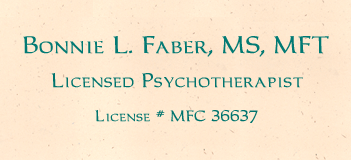 It may come as little surprise, but I can’t even begin to count the number of times I’ve been asked, “So how does one choose a good therapist?” After all, nobody wants to put their personal problems into the hands of an inexperienced, ineffective or insensitive practitioner. Since, as well as being a counselor in private practice, I have also been a patient, I have compiled the following suggestions and guidelines, which you may find helpful when choosing a therapist.
It may come as little surprise, but I can’t even begin to count the number of times I’ve been asked, “So how does one choose a good therapist?” After all, nobody wants to put their personal problems into the hands of an inexperienced, ineffective or insensitive practitioner. Since, as well as being a counselor in private practice, I have also been a patient, I have compiled the following suggestions and guidelines, which you may find helpful when choosing a therapist.
First and foremost, since successful psychotherapy is largely dependent upon the therapeutic relationship built between you and your therapist, you must find a therapist you feel comfortable with. When selecting a counselor, you are not looking for a friend; but you certainly should be looking for someone you feel respects your individuality, views and opinions. While the therapeutic relationship is built on complete confidentiality and trust, it is unlikely you will trust anyone completely the first time you meet them. That having been said, if you feel you must lie to your therapist or withhold important information, you’re not going to get much help from therapy.
According to Barry Duncan and Scott Miller — cofounders of the Institute for the Study of Therapeutic Change — four decades of outcome research have shown that:
- The thoughts, ideas, actions, initiatives, and traits of patients are the most important predictors of therapy success.
- Next to what the patient brings to therapy, the patient’s perception of the therapeutic relationship is responsible for most of the gains resulting from therapy.
- Models and techniques are much less important than generally thought.
So, instead of trying to learn the alphabet soup of letters after various practitioners’ names, you can become a more informed consumer of mental health services by talking with other professionals, contacting a local professional organization or mental health advocacy group, and, most importantly, taking the time to meet with several therapists until you find one that feels like a good fit and you think you can work with. Remember to keep in mind that while referrals from family members, friends, colleagues and other professionals can be helpful in narrowing your selection, finding the “right” therapist is a very individual process and only you can choose the best person for you to work with.
How To Get Started
The first session, sometimes called an Intake Interview, is usually unlike what you can expect from all following therapy sessions. The therapist will ask you what brings you to therapy as well as about your family and general history. The counselor may ask questions regarding your childhood, education, social relationships, romantic relationships, career and current living situation. At some point during or after this interview, the therapist should encourage you to ask any questions you have. But even if they don’t, be sure to ask them anyway. Don’t be shy or afraid to ask point-blank questions… After all, this is about your future health, well-being and happiness!
Unfortunately, too many people spend more time planning their next vacation than they do selecting a therapist to work with. Ask prospective therapists how long they’ve been in practice, how many patients they’ve seen with similar concerns and when was the last time they treated someone with a similar issue. And, although I said degrees aren’t that important to the success of therapy, they do serve to indicate how extensively the therapist has been trained. No ethical professional should mind being asked about their educational and professional background. In addition to these questions, you may want to ask prospective therapists about their training and theoretical orientation. If you don’t feel the therapist is responding openly and honestly to your questions, you are probably best off looking for another therapist to work with.
Just as no two people are identical, neither are any two therapeutic relationships. And the course of therapy never follows a linear path of progression. Therapy, like life, has its ups and downs. Moments of stress and discomfort may be experienced as painful past memories are revisited, and joy and confidence come from the new insights and understanding therapy bestows. While there may be times during the course of treatment where it seems the pain is worse than it was when you first sought help, you must also feel that your therapist is really committed to helping you.
Choosing Your Future
Deciding to seek professional help for your problems and selecting a therapist to work with are important and courageous steps towards your future happiness and well-being. Equally important is your commitment to achieving your goals through the therapeutic process. Psychotherapy can be difficult work, but the rewards of therapy can be greater than those of any other investment you can make. I encourage you to contact me with any questions you have regarding psychotherapy in general or my practice in particular. And, I congratulate you on taking care of yourself and taking the steps necessary to move your life in the direction you want it to go!

